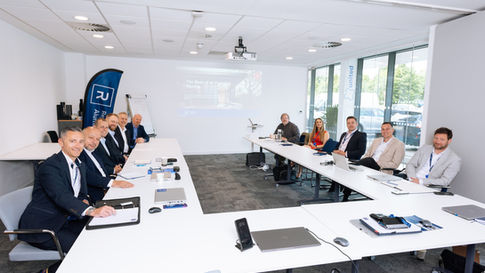Rinnai’s Chris Goggin looks at what the new government will face in establishing a coherent set of policies to achieve net zero in a pragmatic, economic and technically feasible manner.

The new Labour government needs to legislate for UK customers to have flexible energy options that reflect the practical, economic, and technical reasoning needed to design and install decarbonising technology. Previous UK policy has struggled to address the practical, economic, and technical feasibility nuances of the UK building stock and instead touted a heat pump-only approach.
Now that a new government is in place, an adapted national policy that affects both off and on-grid customers should focus on supplying UK customers with practical, cost-effective solutions to every individual site.
Additionally, the new government must provide a policy framework that supports a range of low-carbon fuels capable of efficient performance and carbon reduction. There must also be focus on an open and transparent collaborative approach right across the power and energy industries, so that everyone can transition towards a low-carbon future.
One way in which the new government will be measured is the direction of off-grid fuels and appliances.
Off-gas grid options
There are approximately 1.65 million non-domestic buildings in England and Wales. These buildings are diverse in size and structure and include commercial and public premises. Half (48%) of those surveyed used a form of electric heating, while 30% had an oil boiler and 12% an liquified petroleum gas (LPG) boiler.
Of these, around 280,000 are in areas not connected to the gas grid, and many use either oil, LPG, or coal powered heating systems. Phasing out fossil fuel installations will require a significant increase in the deployment of low-carbon heating solutions, such as hybrid heating and hot water systems.
There were also around 4.4 million households across the UK not connected to the gas grid in 2021, accounting for 15.1% of domestic properties. Heat pumps are a viable carbon-reducing technology capable of covering a sizable percentage of UK decarbonisation targets but are unlikely to satisfy rural customers due to a lack of insulation and other technical issues in older off-grid properties.
Rather than replacing a boiler or commercial water heating system and purchasing a heat pump, there are alternative ways to provide heat and hot water to off-grid properties. Drop in solutions such as BioLPG and future fuels such as r-DME mean that boilers and water heaters do not have to be replaced. Gaseous systems that accept fossil fuels are also capable of receiving biofuels as legitimate energies. The future capacity of r-DME and other alternative biofuels are set to rise sharply, increasing the likelihood of this fuel being introduced nationally.
Off-grid UK residents need to decarbonise just as owners of all other residential and commercial properties. The UK government needs to implement a nationwide plan that is designed to ensure the quickest and cleanest route towards carbon reduction.
Current proposals insist all fossil fuel and LPG domestic boilers and commercial water heaters that provide heat and hot water to off-grid domiciles and commercial properties will be banned from 2035. Currently, a heat pump is the preferred method of providing clean energy for off-grid heating and hot water. This policy approach unfortunately does little to address those hard to abate properties.
There have been huge investments, on a global scale, in researching synthetic and alternative fuels for off-grid properties. For example, Dimeta - a collaborative effort by two of the world’s leading LPG distributors, SHV Energy and UGI International – is constructing a £150 million renewable and recycled carbon DME production plant in Teesside. Once operational the plant will produce over 50,000 tonnes of DME from non-recyclable waste – the equivalent of 25% of LPG domestic heating in the UK.
Rinnai and Dimeta are working together to design and produce off-grid energy and hot water supplies to properties not connected to the UK national grid. The companies will work together to explore blending DME with LPG in existing appliances, as well as developing 100% DME dedicated appliances.
.png)








































.png)










